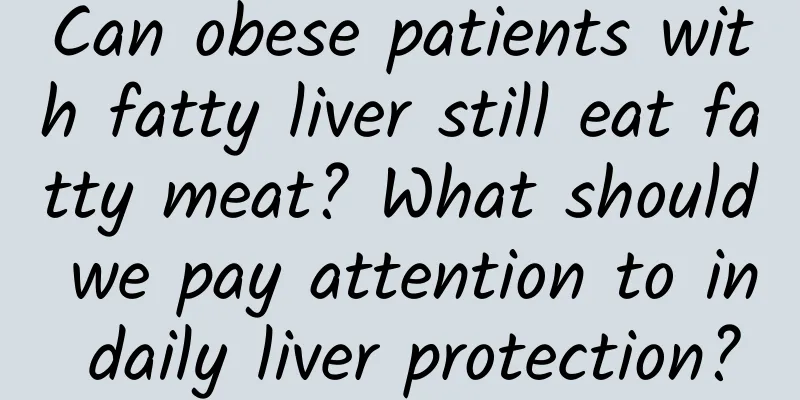Can obese patients with fatty liver still eat fatty meat? What should we pay attention to in daily liver protection?

|
Author: Fan Jiangao, Chief Physician of Xinhua Hospital affiliated to Shanghai Jiaotong University School of Medicine Chairman of the Fatty Liver Expert Committee of the Chinese Medical Doctor Association and Dean of the Fatty Liver College Reviewer: Zhang Yu, researcher at Chinese Center for Disease Control and Prevention Currently, 80% or even 90% of fatty liver is simple fatty liver, with normal liver function and no symptoms. However, it is related to the occurrence of diabetes, arteriosclerosis, and colorectal adenoma, and is now increasingly recognized by the world. Simple fatty liver is mainly believed to be related to diet. Eating too much greasy food, being overweight, obese, and having insulin resistance can easily lead to high blood sugar, hardening of arteries, and polyps in the intestines. If intestinal polyps are not treated in time, they may turn into cancer over time. It is now believed that colorectal cancer is closely related to fatty liver, so middle-aged people with fatty liver should be screened for colorectal cancer regularly. Figure 1 Original copyright image, no permission to reprint The best treatment for fatty liver caused by obesity is to lose weight, control weight gain, and reduce waist circumference appropriately. In fact, losing 3%-5% of body weight is enough. For example, if a person weighs 70 kg and has fat deposits in the liver, and even has abnormal blood lipids, blood sugar, and blood pressure, and excludes other causes, it will take about a year to lose 2-3.5 kg, a 3%-5% body weight reduction, and if this can be maintained for more than half a year or a year, and then an ultrasound is done, the fatty liver will have almost 100% disappeared. Therefore, for fatty liver caused by obesity, it is very important to lose weight and control diet. 1. How should patients with fatty liver eat? For obese patients with fatty liver, dietary management emphasizes three aspects. First, control the total amount. To put it bluntly, you should not eat too much, but feel full even if you eat less. Whether you are full or not is not decided by the stomach, but by the brain. When the stomach sends this information to the brain, the brain says that you can't eat anymore. If you eat a few more mouthfuls in a hurry, you may gain 2-3 kilograms of weight in a year. Therefore, you should eat slowly and chew slowly. Chewing slowly can also easily produce a sense of fullness. Second, adjust the diet structure. Eat mainly grains, supplemented by animal foods, eat less fried foods and fast food as much as possible, and eat more whole grains and vegetables; try not to drink beverages, drink more boiled water, more tea, coffee is also OK, but put less sugar and milk to reduce calories; use vegetables instead of fruits, and eat as little fruit as possible. The biggest difference between fruits and vegetables is that they are high in sugar and calories. Fruits contain vitamins, minerals, and fiber, and fresh vegetables also have these, such as cucumbers, tomatoes, and carrots can be eaten raw. If you really want to eat fruit, eat it before meals during the day, not after dinner. Figure 2 Original copyright image, no permission to reprint Third, the three meals a day should be distributed reasonably. It is recommended to eat breakfast, and the focus should be on controlling dinner. Dinner should not be eaten too late, and not too close to bedtime. Dinner should not be eaten too well, too much, or too fast. The most important thing is, after dinner, try not to eat anything else, even fruits, milk, and yogurt. Don't eat them anymore. These can be eaten for breakfast. Nowadays, many people have the habit of skipping breakfast or eating less breakfast, and eating too late and too much dinner, which is also a reason for excess calories and high incidence of obesity. From a dietary perspective, if you keep these three aspects in mind, your weight will be easier to control and the fat in your liver will slowly decrease. 2. Can patients with fatty liver still eat fatty meat? There are many debates internationally about patients with fatty liver, or obese patients with fatty liver. One theory holds that fat intake should be strictly limited, while another theory holds that fat can be eaten as much as you want and carbohydrate intake should be strictly limited. Some even believe that limiting carbohydrate intake is better for weight loss than limiting fat intake. I think patients with fatty liver or obese patients with fatty liver can still eat fatty meat. I have no objection to you eating braised pork. You can eat it, but you can't eat too much at one time. It's okay to eat more occasionally, and it's okay to eat it frequently as long as the amount you eat at one time is not too much. Dietary control mainly emphasizes negative calorie balance. Only when a negative balance occurs can fat reserves be mobilized. Compared with daily intake, reduce 500-1000 calories a day, eat less of this and less of that, and it will be effective only if you persist. 3. How do patients with fatty liver protect their liver? The latest animal experiment research shows that after three days of high-fat diet, the liver will have fatty changes; after three months of high-fat diet, the liver will have obvious fatty changes, which is called fatty liver. When mice with fatty liver and mice without fatty changes are drunk once, the mice with fatty liver will suffer from severe liver damage. Therefore, a liver with fat deposits is more vulnerable to damage than a liver without fat deposits. Being drunk once is equivalent to an acute hepatitis attack, which is not an exaggeration for patients with fatty liver. Therefore, if you have fatty liver, you should be especially cautious when you come into contact with drugs, poisons, alcohol, and hepatotoxic substances. Figure 3 Original copyright image, no permission to reprint In addition, patients with fatty liver should also be cautious when undergoing liver surgery. During a liver surgery, the volume of liver resection that a liver with fat deposits can tolerate is much smaller than that of a normal liver. |
>>: Can't drink raw water? Must these foods be thrown away? And take all kinds of precautions!
Recommend
Is lotus root powder nutritious? How to tell whether lotus root powder is pure or not?
Lotus root powder is a traditional nourishing foo...
Where is the best place for warm moxibustion for women?
Moxibustion is a common treatment method in tradi...
Useful information! A guide to online consultation and Internet clinics for COVID-19 in various hospitals in Beijing
In order to meet the needs of residents for home ...
Can I open the windows after a miscarriage?
With the current social development level and adv...
Is it good to shave the dog's hair? What should I do if the dog has skin disease in autumn and needs to be shaved?
In the hot summer, dogs will lose a lot of hair. ...
Can I get pregnant if the blocking antibody is negative?
If a normal woman is pregnant, if the blocking an...
What are the symptoms of pelvic cysts?
Pelvic cysts are relatively common ovarian cysts....
How to apply lip balm
Lip oil is a skin care product that can be applie...
Diabetics should keep in mind their diet during the National Day holiday
The National Day holiday is here again. Every yea...
Is it normal to not have menstruation at the age of 48?
As we age, the functions of some organs in our bo...
What to do if a female urethra has a fleshy pimple
Recently, many friends have developed fleshy lump...
What causes women to have odor down there?
For most women, there should be a smell down ther...
These 6 reasons cause 25% of people in our country to have high blood pressure! Check if you have it
According to statistics, there are currently 300 ...
Don’t waste your money! These are the physical examinations you need to do at different ages, save them now!
As people's living standards continue to impr...









